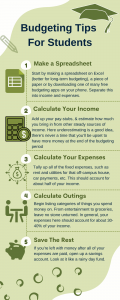College Student Guide: How to Not Overspend

While it might sound dramatic, admitting you have a problem with spending money is the first step to stopping and taking control of your own finances. Being a college student is already hard enough without worrying about money.
As a college student there are various opportunities to spend money when you might not necessarily have it (or it could have been spent elsewhere). There are many reasons or temptations that make it hard for college students to not spend money,
- Going out to the bar
- going to concerts
- eating out because there is little to no time to make food or just easier than grocery shopping.
How to Not Overspend When Going Out
Most college students are lucky enough to not have to deal with many of the expenses of being an adult. Maybe your parents still pay for your car or cell phone, or maybe you’re independent and already pay for everything. Either way you have some type of income supporting you through this journey.
Nights out at the bar, concerts, eating out to avoid the cafeteria food, the list goes on, but as fun as these activities can be, looking at your bank account and realizing you’re short on money for important expenses or even a last minute activity with friends can be aggravating to say the least. When you create and stick to a budgeting plan it can allow more room for these types of activities in the long run without worrying about important expenses.
Read below to find a few tips on how to budget your money and beat that habit of overspending for good.
Budgeting the Right Way
Making a budget is simple, it’s sticking to it that’s difficult. When beginning consider a weekly or biweekly budget. After all, some people (myself included) don’t have the patience or foresight to keep a monthly budget. Below are a few steps to help you create a budget and figure out where all that money is going:
- Make a Spreadsheet – Start by making a spreadsheet on Excel (better for long-term budgeting), a piece of paper or by downloading one of many free budgeting apps on your phone. Separate this into income and expenses.
- Figure out how much money you make in the budgeting period. Add up your pay-stubs, and estimate how much you bring in from other steady sources of income, such as tips. Here underestimating is a good idea because there’s never a time that you’ll be upset to have more money at the end of the week, two weeks, or month than you were expecting. Of course, don’t underestimate too much or it will throw your entire budget off.
- Next, figure out how much you pay for your fixed expenses like bills. More power to you, but also more reason to set up a budget. Tally up all of the fixed expenses, such as rent and utilities for that off-campus house, car payments, etc. This should account for about half of your income.
- Be realistic with your spending habits. Begin listing categories of things you spend money on. From entertainment to groceries, leave no stone unturned. Unlike with your income, here it helps to overestimate to a certain extent because setting up too strict of a budget for fun activities or even essentials is setting you up for failure. In general, your expenses here should account for about 30-40% of your income.
- Save the rest – If you’re left with money after all of your expenses are paid, rather than blowing the rest of your money impulsively consider opening up a savings account where you put it. Look at it like a rainy day fund. A great idea is after a few months of successful budgeting use some of this money to reward yourself.
- Finally, put it to the test. Test out your budget and see if you were able to stick with it for the allotted time. Adjust your numbers accordingly and continue with the next week, two week or monthly cycle. Knowledge is power and knowing exactly where your money is coming from and going can go a long way.

Interested in creating a personal budgeting plan with expert advice, contact Roundleaf Inc. Our budget planning and personal finance experts at Roundleaf Inc. can show you how a financial plan can make your goals a reality with a balanced budget.
